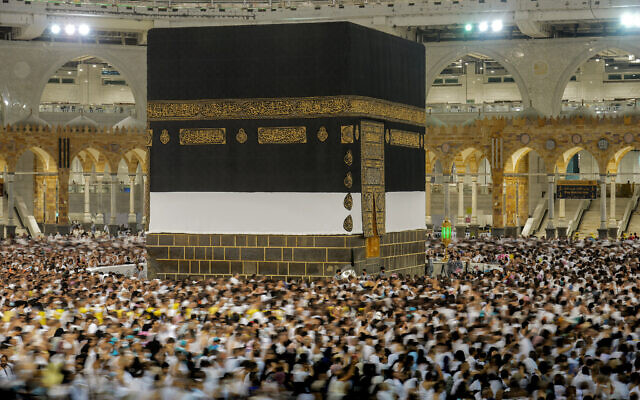Flights between Israel and Saudi Arabia for Muslim pilgrims won’t be ready for Hajj
While US, Saudi and Israeli officials had been working to get line up by end of month, Hanegbi says they weren’t able to pull it off; reason not said to be political
Jacob Magid is The Times of Israel's US bureau chief

Direct flights between Israel and Saudi Arabia for Muslim pilgrims will not be available in time for this year’s Hajj, after months of intensive efforts by Israeli, Saudi and American negotiators, National Security Council chairman Tzachi Hanegbi confirmed on Monday.
The Biden administration has viewed launching the direct line as a step toward reaching a normalization agreement between Israel and Saudi Arabia. During US President Joe Biden’s visit to the region last July, the idea was included in a package of steps that Washington had managed to secure, including an agreement by Riyadh to allow Israeli overflights.
The White House announcement said the US “welcomed related steps under discussion to include direct flights from Israel to Jeddah for next year’s Hajj on approved carriers.”
The parties have since been in talks to get the flights up and running in time for this year’s pilgrimage from June 25 to July 2.
But Hanegbi told the Kan public broadcaster on Monday that they would not succeed in time. “Perhaps for the next Hajj we will be in a position to help in this matter, and [direct] flights will depart from here… but it’s too early to say.”
Citing three sources familiar with the matter, Kan later reported that the delay was not politically motivated as far as Saudi Arabia is concerned. The broadcaster said the airline the sides were hoping would run the flights was unable to prepare in time.

While Hanegbi said the new goal would be to have the flights running by next year’s Hajj, the subsequent Kan report said Israel was still hoping to roll out the direct line later this year for Muslim pilgrims looking to travel to Mecca outside the Hajj season.
The Hajj is a once-in-a-lifetime duty for all Muslims physically and financially able to make the journey, which takes them along a path believed to have been traversed by the Prophet Muhammad some 1,400 years ago.
Currently, Saudi Arabia accepts Muslim pilgrims arriving from Israel to Mecca but requires them to travel through a third country, increasing the cost of the already pricey journey. According to Maariv, 2,700 Israelis embarked on the pilgrimage in 2022, and this year, the figure is expected to almost double to 4,500.
Despite the hiccup with the Hajj flights, the Biden administration is still working to secure a full normalization deal between Israel and Saudi Arabia in the coming months.
Biden’s top aides have visited Riyadh in recent weeks to discuss the matter and they have subsequently been updating Prime Minister Benjamin Netanyahu on their efforts.

Still, several US officials assessed the chances of a deal at less than 50 percent in a New York Times report on Saturday.
Saudi Arabia is demanding US support for a civilian nuclear program along with a series of security and economic assurances as well as significant weapons purchases, according to US, Israeli and Arab officials.
Given Riyadh’s checkered human rights record, Washington is hesitant to heed such demands, and Jerusalem also has concerns about being able to maintain its so-called “Qualitative Military Edge” over its neighbors.
Saudi officials have also made clear to the Biden administration that any agreement with Israel will have to include a significant gesture for the Palestinians, a senior US official told The Times of Israel in May.
This would likely pose a significant obstacle for Netanyahu, given that the majority of his coalition is ideologically opposed to any move that offers them a pathway to statehood.









